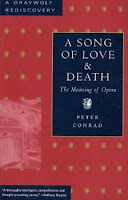The subtitle of Conrad's book is 'the meaning of opera' but this is something of a paradox, the meaning of something which is irrational. Opera is very much a hybrid, with most composers needing a librettist. Though Wagner wrote his own librettos, he used sexual images to talk about the relations of the words and music. The male side was the writer, inseminating the female side which wrote the music.
Both Conrad and Barlow agreed that the relationship between librettist and composer is a fraught one. Barlow used an example from his own experience writing opera, and pointed out that music can extend and comment on what is present in the text. Relations between composer and librettist rarely end harmoniously. Conrad talked of how both Stravinsky and Henze hated Auden's texts for the operas which he wrote for them, finding the texts too complicated and too difficult to ravage as music needs to. Opera is predicated on the superior power of music over the words (something which is different in a musical).
Conrad commented that, in drama, people rarely die on stage; it happens off stage and gets described. But in opera, the worst happens on stage, people jump off cliffs into a raging seas, they jump into Vesuvious or get killed by an avalanche.
Barlow, however, pointed out that in Britten's Billy Budd, the scene where Billy is told by Vere that he will be executed is done behind a closed door and that Britten depicts this in just 12 or 13 devastating chords in the orchestra. Conrad mentioned Britten's commentary on Verdi's Falstaff, and how he had pointed out the orchestration of the moment when Falstaff is waiting under Herne's Oak and midnight chimes. Verdi harmonised every note differently - a purely musical device.
This led to further comment on Britten as a musical dramatist, with the feeling that Britten had the courage as a musician to show what was going on, but not as a dramatist. Conrad pointed out that Britten is always closing the door on us and quoted moments in Owen Wingrave, Peter Grimes and Turn of the Screw. But Barlow took a slightly different view, thinking that music can never be descriptive and that in operas like Lulu and Wozzeck there is a danger of music becoming purely descriptive. Great operatic music gives you room to work out how you are going to respond to it.
Attention turned to Puccini, where in Madama Butterfly, the title character's final suicide is behind a screen and in the orchestral interlude after the humming chorus, the orchestra depicts Butterfly's real pain. Elsewhere in Puccini's operas, though, there is a sense of music being pain, of the composer begin excited by his power to extort music from his characters.
Discussion turned to comedy and Conrad talked of how he first got to know Mozart's Don Giovanni via Klemperer's very serious recording and how, when he first saw it on stage, he was shocked that people laughed. The text and the dramatic situations are comic but the music, as in all of Mozart's comedies, is serious, telling you what the characters are realling feeling and thinking.
Music is too compassionate an art to do comedy, with some rare exceptions such as Rossini at his most cynical. Both thought that Verdi's Falstaff was a far greater work of art than Shakespeare's play. Verdi's opera being full of elemental life forms and the joy of human existence. Barlow talked of how the composer Alan Ridout told him that only great composers can write joy.
See our other coverage of Buxton Festival on this blog.
Elsewhere on this blog:
- Buxton Festival Double Bill
- Curlew River
- Poulenc choral music - CD review
- Paul Mealor premiere - JAM at City of London Festival
- Messiah - Les Arts Florissants - CD review
- Les Pecheurs de Perles at OHP
- Holst Singers at Temple Church
- War Requiem at St. Pauls' Cathedral
- A Fool for Love - Michael Spyres - CD review
- Hansel and Gretel at Garsington
- Death in Venice at ENO
- Clavier Ubung III - CD review
- Gloriana at Covent Garden
- Home












No comments:
Post a Comment